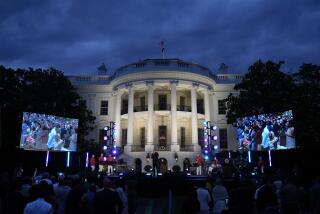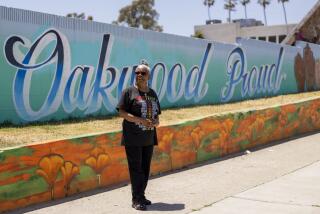Emancipation Commemoration : Positive Outlook Prevails at O.C. Juneteenth Fest
- Share via
SANTA ANA — Sitting under a shady tree at Lillie King Park, 65-year-old Jim Colequitt polished off a barbecued rib and prepared for an afternoon of dominoes and his favorite card games, pinochle and bid whist.
For Colequitt, this evoked memories of the Juneteenth celebrations in his home state of Texas.
“It was such a big deal in Texas that we’d take the day off work,” said Colequitt, of Placentia. “It’s a real family gathering.”
At Saturday’s sixth annual Juneteenth Celebration, sponsored by the Orange County chapter of the NAACP, dozens of families sat on blankets and lawn chairs and relaxed in the afternoon sun as they ate Texas-style barbecue and listened to a wide range of musical performances.
Juneteenth--June 19--is an unofficial holiday observed by many African Americans primarily in Southern states. The holiday’s origins come from the Civil War period, when news of the Emancipation Proclamation signed by President Abraham Lincoln finally reached Texas slaves in June 1865--more than two years after it went into effect.
“Everything here is positive,” said James Tippens, president of the local chapter of the National Assn. for the Advancement of Colored People. “With so much overt racism in the world and all that has gone on with affirmative action, we are trying to look at positive things. I think people need to come together. The bottom line is unity.”
About 250 people attended the event, which has steadily grown in popularity since 1990 and was celebrated on Saturday, four days early.
The festival was moved last year from the smaller Prentice Park in Santa Ana to the more spacious Lillie King Park, named after a Santa Ana community and civil rights activist who died in 1982. The event featured dozens of vendor and information booths, children’s games, a raffle and entertainment.
“There’s a lot more participation now,” said 55-year-old Sandy Brown, who came with her daughter, sister and grandchildren. “I think it’s something that is progressing along.”
Karen Isreal, 36, came from Pasadena with her two young daughters to enjoy the festivities. “I come to show support,” Isreal said. “I just enjoy this gathering of my people, meeting new people and supporting the booths. I love being here.”
Jennifer Watkins, 37, was selling handcrafted dolls and hand-painted ceramics that included cherubs and children. She also displayed a collection of cookie jars and teapots made in the likeness of Aunt Jemima.
“In the 1940s, she was done in a negative way,” Watkins said. “In the 1990s, I’m trying to bring her back in a positive way. She’s a part of our heritage and background--a strong female in the home.”
Betty McCants used the event to encourage people to enter the Judie Davis bone marrow recruitment program. Davis, an African American woman, died while waiting for a suitable bone marrow match.
“A match for people of African descent are a one-in-a-million match, compared to one in 100,000 for everyone else,” McCants said.
The National Marrow Donor Program was present at Juneteenth celebrations nationwide because of the urgent need for African Americans to be tested and increase the chances for patients, organizers said.
More to Read
Sign up for Essential California
The most important California stories and recommendations in your inbox every morning.
You may occasionally receive promotional content from the Los Angeles Times.













